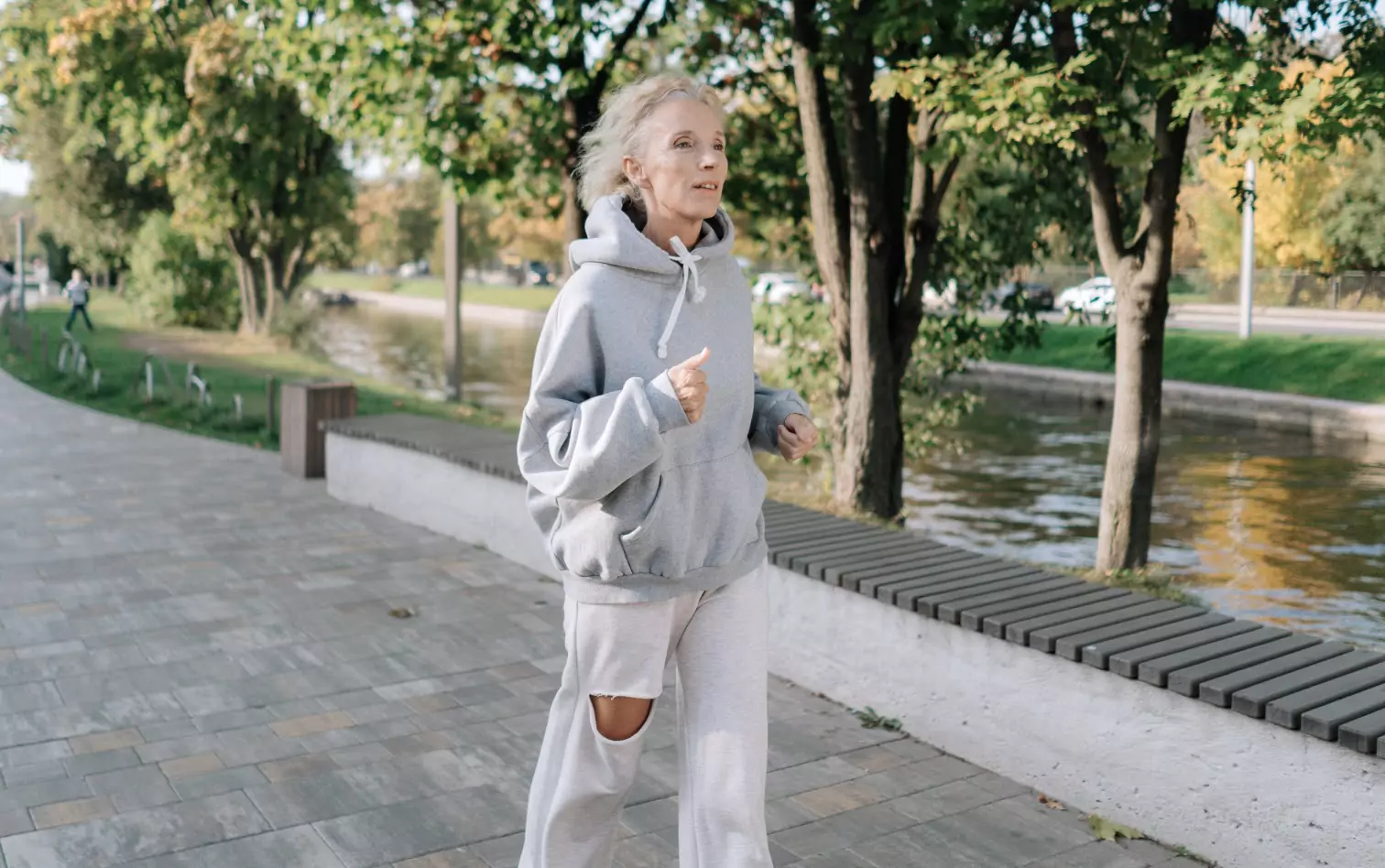10 Alarming Habits That Are Making You Age Faster

Key Takeaways
Have you ever wondered why some people look much older than their actual age, while others seem to stay looking younger for longer? You may be able to find the answer in their lifestyle choices.
While lifestyle habits and dietary choices aren't the only things that can speed up aging, they're certainly some of the most critical factors. And although some aspects of aging are inevitable, there are a few unconscious habits that can accelerate the process.
You can't always reverse aging itself (it's a natural part of life!), but correcting these habits can help slow any premature aging. Knowing what they are is the first step!
Read on to learn more about premature aging and what you can do to prevent it.
1) A Constant Diet of Unhealthy Foods

It's no secret that a healthy diet is the first step towards overall wellness. However, the dietary choices that you make throughout your life may also affect how quickly you age as well as your health risk of developing age-related diseases. Eating primarily ultra-processed foods and trying too many crash diets may speed up the rate at which your cells age.
Research has shown that diets high in sugar can speed up your body's aging process.
Maintaining a Healthy Diet for Healthy Aging:
- The first thing to remember is that everyone's dietary needs are unique. Your needs will depend on your genetics, age, medical conditions, and level of physical activity, among other things. So, you'll need to understand what your body needs to create a diet plan that's best for you.
- Pick whole, unprocessed foods over processed, packaged foods whenever possible.
- Ensure that you balance your meals with protein, healthy fats, fiber, and complex carbohydrates.
- Stick to an eating schedule. Eating meals at a similar time every day can help you make better decisions regarding your food choices and the quantity of food you consume.
2) Consuming Too Much Alcohol

It's no secret that alcohol consumption increases the risk of developing cardiovascular disease, stroke, liver disease, high blood pressure, and cancer, but did you know that it can also lead to premature aging? There's a lot of talk about the health benefits (or lack thereof) of alcohol.
There are potential benefits of certain types of alcoholic drinks, like red wine with its antioxidant properties. However, numerous studies have shown that it would require a significant amount of red wine consumption to gain any potential benefits, and the risks outweigh the benefits.
Additionally, it also affects blood sugar and damages the genetic material in cells, leading to accelerated aging.
There are two main things to consider about alcohol and aging:
- How alcohol affects your overall health
- How it impacts the aging process
It's important to keep in mind that everyone's body responds differently to alcohol. It's crucial to consume alcohol responsibly and pay close attention to how your body reacts. For people with type 1 or type 2 diabetes, it's especially important to monitor blood sugar levels as alcohol can cause drastic blood glucose fluctuations.
Drinking Alcohol and Aging Healthily:
- The CDC and the National Institute on Alcohol Abuse and Alcoholism (NIAAA) define binge drinking as a pattern of drinking over four (for women) or five (for men) alcoholic beverages in two hours. If you think your habits fit this definition, speak to your doctor about creating a plan to reduce the amount you consume.
- While it's alright to indulge in the occasional drink, it's important to pause and reflect upon your alcohol intake when you're in social situations. Resist the urge to rely on alcohol when you're alone, as this can hinder the formation of unhealthy patterns of heavy drinking and alcohol use disorders.
3) Overwhelming Stress or Anxiety

We all experience stress on occasion, but did you know that too much of it too often can lead to premature aging? When you're stressed, your body releases a hormone called cortisol. When cortisol is chronically elevated, it can affect skin, gut health, and mental health.
Chronic stress also creates free radicals in the body, damaging cells and leading to early signs of aging. Fortunately, there are ways to combat stress and keep yourself looking young and vibrant.
How to Handle Stress and Anxiety:
- Make time for yourself every day to practice self-care. Self-care looks different for everyone and can include anything from meditation and reading to a walk outside, a laidback spa day, or light movement.
- Set boundaries at work and with friends. Don't let other people's expectations dictate every aspect of your life.
- Try breathing exercises like the 4-7-8 breathing technique to calm you down when you feel overwhelmed.
4) Insufficient Sleep

Do you often find yourself feeling exhausted all the time? If so, you're not alone. It's usually due to a lack of sleep or a lack of restful sleep. It's a common problem, especially among those who are aging.
According to orthopedic spine surgeon Dr. Carl Giordano, "Sleep is essential for overall physical health and overall well-being, and it's crucial as you get older. When you don't get enough sleep, your body produces more stress hormones, which can worsen insulin resistance and increase your risk of a number of health conditions."
Tips for Good Sleep Habits:
- Try to get an average of seven to nine hours of sleep every night. You may need more sleep than others, and that's okay! Listen to your body's needs. Remember, though, oversleeping can also make you feel exhausted.
- Set a regular sleeping schedule. It'll help your body set a good rhythm.
5) A Smoking Habit

Did you know that smoking can dramatically affect the way you age? Smoking is a well-known risk factor for developing many diseases, such as cancer and coronary heart disease. It can also affect how fast you age. Smoking can cause wrinkles, age spots, and other signs of aging.
Smoking can make you more likely to develop conditions like cataracts and macular degeneration. And according to Dr. Giordano, "it can also damage bones and joints, and contribute to inflammation."
If you think that vaping is a better alternative, think again. Vaping and electronic cigarettes still contain nicotine, which is highly addictive and can harm your health. Plus, these products often contain other harmful chemicals, such as acetaldehyde, formaldehyde, and acrolein, which have even greater hazards compared to smoking regular cigarettes.
Tips to Ditch Your Smoking Habit:
- Try smoking cessation products, like nicotine gum or patches.
- Consider cutting down gradually by changing some of your habits. For example, if you usually have a cigarette after every meal, try cutting it down to after two meals, then one, and so on.
It can be challenging to quit smoking on your own because your brain is addicted to nicotine. If you're having a hard time, talk to your doctor. They can create a plan by recommending support groups, therapists, and medication to help you kick the habit.
6) Too Much Time in the Sun

Do you love spending time in the sun? While it's enjoyable, too much sun can have some pretty harmful effects on your skin. Recent studies have shown that too much time spent in the sun can speed up aging.
It's because the sun's ultraviolet (UV) radiation can damage your skin, leading to wrinkles, age spots, and even skin cancer. While it is vital to get some vitamin D from the sun, it is crucial to be aware of the dangers of overexposure and take precautions to protect yourself.
Tips to Reduce UV Ray Exposure:
- If you know you'll be in the sun, remember to apply sunscreen.
- Avoid tanning beds. They use artificial UV rays to make you tan and affect your skin as you age.
7) A Lack of Activity or Exercise

Believe it or not, lack of activity and exercise can lead to premature aging. It's essential to be proactive about your health and ensure that you regularly get enough physical activity.
According to Dr. Giordano:
"As you age, a lack of exercise can lead to weakened muscles, reduced bone density, and an increased risk of developing chronic diseases such as obesity, heart disease, and type 2 diabetes. Insufficient exercise can also lead to muscle weakness, bone loss, and an increased risk of falls and fractures."
These health issues occur because the body produces less testosterone, the hormone responsible for developing and maintaining muscle mass. Although you can't reverse this natural process, there are ways to slow it down or minimize its effects. One way to do this is through regular exercise.
Tips to Stay Active and Fit as You Age:
- Find something that you love to keep you active. If you aren't having fun, the exercise you chose may not be the right one for you.
- Do something small to stay active every day, like stretching before bed or going for a midday walk.
- Stay active as you age, even if it's just around the house. Things like daily chores and remembering to get up and stretch or walk around every 30 minutes can benefit your overall well-being and keep you feeling and looking younger.
8) Sitting Too Much

Speaking of staying active, do you sit in one spot for too long? Even if you have a desk job or need to be at your computer for hours at a stretch, sitting for prolonged periods isn't a good idea.
If you want to feel young, stay healthy, and reduce the risk of accelerated aging, it's essential to break up the amount of time you spend sitting with regular breaks throughout the day. Luckily, there are plenty of ways to do this, so you can get up and move without interrupting your work or daily routine.
Tips to Avoid Sitting Too Much:
- As we mentioned above, make sure that you get up and walk around (even if it's just around the house) every 30 minutes, or at least every two hours.
- Try working standing up occasionally. If you work from home, consider investing in a standing desk next time you buy office furniture.
- Wear a smartwatch. It'll remind you to stand after recognizing that you have been sitting still for too long.
9) Not Drinking Enough Water

You need it to survive and thrive, but do you drink enough of it? It's no secret that drinking enough water is essential for good health, but many of us don't drink as much water as we should.
You may not immediately recognize the effects of dehydration on your body, especially as you age. But, it's crucial to stay hydrated to stay healthy!
Tips to Stay Hydrated:
- Keep track of how much water you are drinking every day. Use a large water bottle, fill it every morning, and finish it before you go to bed.
- Drink a full glass of water when you wake up and an hour or two before you go to sleep.
- The Academy of Nutrition and Dietetics recommends drinking nine to 13 cups of water per day. Of course, the amount you need can vary depending on numerous factors including your height, weight, activity level, the amount you sweat, and the climate around you.
10) High Glucose Levels

What's the scoop on glucose and aging? High blood sugar levels aren't just a problem for people with diabetes. High blood sugar levels can also cause many age-related health problems. Glycemia resulting from high glucose levels is actually a biomarker for perceived face age. The more frequent the hyperglycemia, the older the perceived age appears to be.
Believe it or not, reducing your glucose intake may be one of the solutions! Your body makes glucose from carbohydrate foods, and the quick-digesting carbohydrates from refined and processed foods, in particular, can contribute to higher levels of glucose. So, eating more whole foods is a good way to begin balancing your glucose intake.
Tips for Good Glucose Management:
- Take the time to understand your body's unique needs, considering factors such as your genes, health conditions, and age. It's important to prioritize regular check-ins with medical professionals and have open discussions about your dietary requirements with a doctor or dietitian. By fostering a deep understanding of your body, you can make informed decisions that support your overall well-being.
- Use tools like continuous glucose monitors (CGMs) to track and collect your body's data. Your body will tell you what it needs; you just have to understand what it tells you… and a CGM can help you do that!
Engage with Your Blood Glucose Levels with Nutrisense
Slowing down the aging process isn't just about skincare routines or genetic luck. It's deeply intertwined with the choices we make every day, from what we eat to how we move and manage stress. Among these choices, maintaining stable blood glucose levels emerges as a pivotal factor in promoting overall well-being and keeping those unwanted signs of aging at bay.
Nutrisense allows you to understand how your daily habits, from your morning meal to your bedtime routine, affect your glucose levels and your body's aging process. With CGM technology, Nutrisense empowers you to make lifestyle adjustments that support a healthy lifestyle and help you maintain that youthful glow and energy.
The Nutrisense CGM program isn't just a tool for tracking your blood sugar levels. It's a comprehensive support system designed to guide you on your journey towards optimal health and well-being. Our experienced dietitians and nutritionists are here to provide personalized advice and guidance, helping you make sense of the data and make informed choices that align with your goals.
Are you ready to take the first step to a healthier, more youthful you? Begin with our quiz to discover how Nutrisense can support your unique needs.
Find the right Nutrisense programto turn insight into progress.
Go Beyond Glucose Data with Nutrisense
Your glucose can significantly impact how your body feels and functions. That’s why stable levels are an important factor in supporting overall wellbeing. But viewing glucose isn't enough. Nutrisense, you’ll be able to learn how to use your body's data to make informed lifestyle choices that support healthy living.
One-to-one coaching
Sign up to access insurance-covered video calls to work with a glucose expert: a personal registered dietitian or certified nutritionist who will help tailor your lifestyle and diet to your goals.
Monitor and measure what matters
With the Nutrisense CGM Program, you can monitor your glucose with health tech like glucose biosensors and continuous glucose monitor (CGM)s, and analyze the trends over time with the Nutrisense App. This will help you make the most informed choices about the foods you consume and their impact on your health.
Find your best fit
Ready to take the first step? Start with our quiz to find the right Nutrisense program to help you take control.

Amanda is a Nutrition Manager and Registered Dietitian, with a Masters in Dietetics from Stephen F. Austin State University. Originally from south GA, she got her undergrad degree from Texas Tech University. She worked at a hospital in Fort Worth, TX, for 4 years as a dietitian, counseling those living with HIV.



